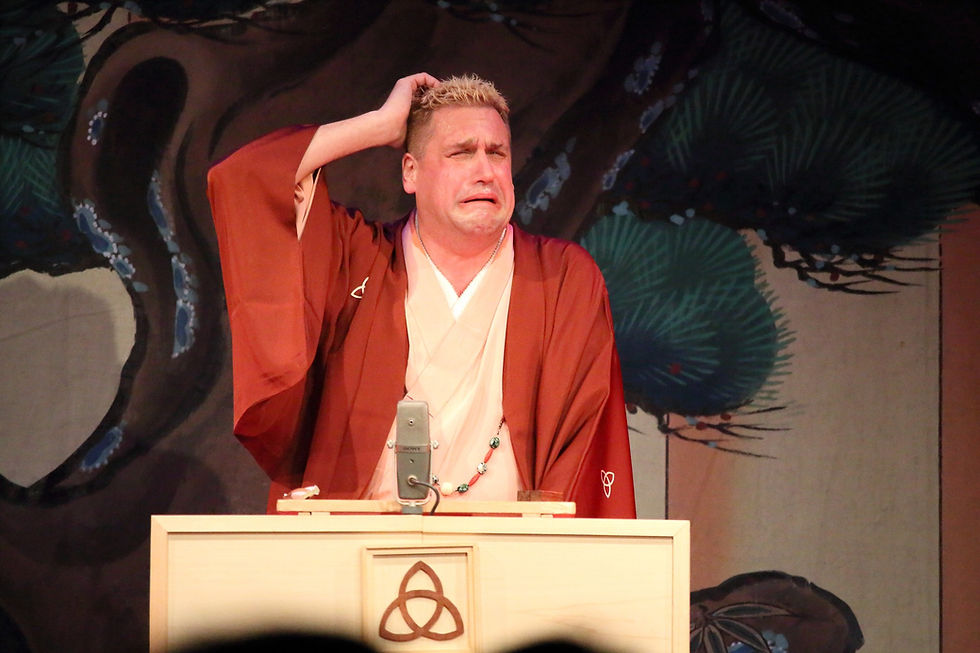Rakugo everywhere!
- Sunshine

- Dec 28, 2017
- 2 min read
Updated: Jan 5, 2019
I have written before that Rakugo is remarkable in its universality - it translates so well, which makes it a rarity for a humorous verbal performance art. Over the last 5 years I have performed in places as various as Singapore, Hong Kong, France, the UK, Ghana, Senegal, Sri Lanka, etc., and have never found a place where I thought, hmm, Rakugo doesn’t work here.
I would attribute this to it’s simplicity. The first half of a Rakugo story, although the performer is kneeling on a cushion in a kimono, is much like stand-up comedy. Self-introduction, self-deprecating opening joke or two, observational comedy, a few words about the host city or town or group or company. Every storyteller creates his or her own material for this, and much is based on the performer’s own personality.
The second half is a one-person play where the Rakugo-ka differentiates characters by moving the head from left to right in conversation. There is almost no narration, so perhaps “story-performing” would be a more accurate way of describing it than story-telling.
A lot of Japanese friends and colleagues are surprised that Rakugo works in other countries, translated into other languages, because it is a traditional art form, it’s history reaches back 400 years, so much of Japanese culture is contained it its stories, characters, situations.
But I have discovered that its roots in Edo period culture actually work it its favour when translating and performing abroad. So much humour in, for example, stand up comedy, is predicated on common reference - so much so that for me as a Canadian I often don’t see the humour in a British comedian’s material, not because my sense of humour is different, but because I don’t get the cultural references (I didn’t grow up in the UK, see the same TV shows as a kid, go through the same school system, etc.)
The same British comedian coming to Canada to perform will edit their material - the co

medians know what humour requires local knowledge and what is more universal.
But Rakugo comes from 400 years ago. And Rakugo performers have constantly adapted the stories so that their immediate audience can understand, cultural references and archaic details are either explained or edited out. Japan 400 years ago is much different to the Japan of today, so Rakugo has already crossed the barrier of time, and the cultural differences between Edo period Japan and modern Japan. So it only makes sense that the stories are ready to cross the language barrier and national borders as well.
I have really enjoyed performing Rakugo in the UK over the last several years (Edinburgh
and London mainly). This actually came as a surprise the first time I performed in London two years ago because Rakugo humour is not exactly what you would call dry British humour. It is very straightforward, simple humour - free of irony or sarcasm or several levels of meaning. However, it makes sense when you think about it. British humour is different from Canadian humour is different from American humour. And yet people still appreciate different sensibilities in comedy from the one that is typical of their own country.
So that is the beauty of Rakugo. So very very Japanese, and yet, it seem, also so very universal.




Mình có lần tình cờ thấy mọi người nói về 789win77 trong một cuộc thảo luận về cách các trang web bố trí thông tin. Thế là mình cũng mở ra xem thử cho biết. Không đi sâu lắm, chỉ lướt qua nhanh để xem cách họ sắp xếp các mục. Ấn tượng là mọi thứ khá ngăn nắp và rõ ràng, dễ đọc nên không bị rối mắt. Với mình như vậy là đủ để có cái nhìn tổng quát rồi.
Mình vừa đọc vài ý kiến trên mạng và thấy mọi người nhắc đến OKFUN, nên cũng quyết định vào xem thử cho biết. Mình chỉ lướt qua một chút để xem cấu trúc và cách trình bày nội dung. Cảm giác là mọi thứ được sắp xếp khá hợp lý, dễ nhìn, không bị rối mắt. Với mình, chỉ cần như vậy thôi là đã đủ để nắm bắt thông tin cơ bản rồi.
Mình vừa lướt web và thấy mọi người bàn tán về https://tr88it.com/, nên cũng tò mò ghé vào xem thử. Mặc dù không đi sâu vào từng chi tiết, nhưng mình đã nhanh chóng quét qua giao diện và cách bố trí thông tin. Ấn tượng đầu tiên là mọi thứ khá ngăn nắp, dễ nhìn. Các mục thông tin được phân chia rõ ràng, không gây rối mắt, giúp mình có thể nắm bắt thông tin cơ bản một cách nhanh chóng.
Hôm nọ mình có thấy mọi người nhắc đến trang https://kqbd79.com/ khi bàn về cách cập nhật kết quả bóng đá và bảng tỉ số, nên cũng thử vào xem cho biết. Mình chỉ lướt qua một chút để xem cách bố trí và sắp xếp thông tin. Thấy trang này trình bày khá hợp lý, các mục rõ ràng nên dù đọc nhanh cũng không cảm thấy rối mắt, với mình như vậy là đủ để nắm được thông tin cần thiết rồi.
Hôm trước mình có thấy đề cập đến XX88 trên mạng, nên cũng muốn thử vào xem cho biết. Mình chỉ lướt qua một chút để xem cách bố trí và các mục nội dung ra sao. Nhìn chung, mình thấy trang này khá dễ nhìn, các phần được phân chia rõ ràng, nên dù chỉ xem nhanh cũng không cảm thấy rối mắt. Với mình, như vậy là đủ để hiểu được thông tin cơ bản rồi.